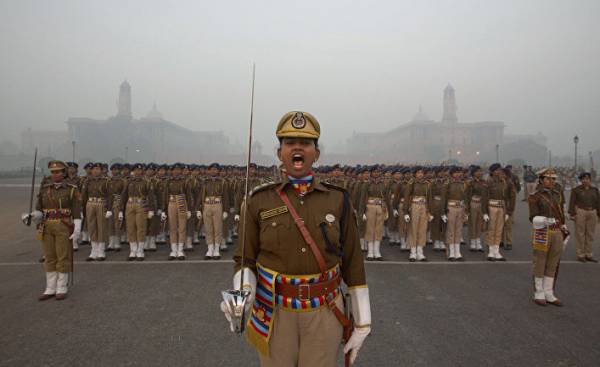
Indian and Chinese troops for almost a month locked in a standoff in the Dock-La, where the borders of Bhutan, China and India, it is the long stalemate of this kind between the two armies since 1962. In a clumsy reference to this last conflict in which India suffered a catastrophic defeat, the representative of the Ministry of national defence Colonel Wu Qian (Qian Wu) warned India that it is necessary “to learn the lessons of history.” But the lessons of history have a special tendency to adapt to the point of view of those who quoted them.
The current Chinese leadership sees the conflict of 1962, the price that uppity neighbor had to pay for failure to comply with its territorial claims. But for India, the conflict was humiliated, tormented the country for more than half a century. Therefore, the reminder of this would probably have the opposite effect than the one expected Wu.
In international relations to be humiliated means more than to be put in an awkward position. Talking about the public degradation of another player, denying his applications for obtaining the status and the establishment of clear hierarchy. The war offer the possibility of humiliation with the most severe ways because the defeat on the battlefield, as a rule, tends to bear not only the taunts and bullying and apparent losses, especially territorial.
If any country should understand the effects of such humiliation, as is China. Virtually the same as Wu’s, sending his message to India, Chinese President XI Jinping stated during the commemoration of the 20th anniversary of the handover of Hong Kong to China that this move put an end to the “humiliation and distress” inflicted by great Britain, when she captured the city in 1842.
This reflects the broader use of the Chinese “century of humiliation” by the Communist party of China, which supposedly ended when in 1949 the CCP established the people’s Republic to foment resurgent nationalism. During this period self-assessment of China as a prominent power in East Asia were undermined by a succession of defeats, particularly painful — from the ambitious Japan.
Despite this acute awareness of the continuing influence of his own humiliation, China often did not understand how his own past actions could cause such feelings in others. His victory over India in 1962 was the culmination of a decade of competing for leadership of the new independent States resulting from decolonization. Consequently, this dealt a crushing blow to the aspirations of India to become the undisputed leader of the non-aligned Movement.
India is not the only country that suffered humiliation on the part of China. In Vietnam, the phrase “1000 years of Chinese domination” has the same resonance as “100 years of foreign humiliation” in China.
But China is not the only country that has been humiliated and, in turn, humiliated the other. Subjected to humiliation by China in 1962, India itself was the reason that nine years later, her neighbour, Pakistan will remember how humiliating defeat. After independence in 1947, Pakistan has sought to establish itself on an equal footing with India in South Asia by joining alliances with the United States at the head or having become acquainted with China, to demonstrate its strategic importance. Indo-Pakistani war of 1971, which led to the independence of East Pakistan (now Bangladesh), destroyed these hopes.
Nevertheless, Pakistan continues to ignore the humiliating consequences of their own actions: his almost forty-year history of intervention in Afghanistan to provide “strategic depth” to leave Afghanistan traumatized for years to come, causing more damage than Russia. The same applies to all these humiliations: they are particularly painful because of their imposed Asian neighbour rather than a distant power.
Such humiliation, what we see in the case of China, have a lasting impact. Indeed, they can create an overwhelming desire for revenge that overwhelms a more robust foreign policy motivation. That’s why, for example, the Pakistan army is ready to undermine all other institutions in the country which she had sworn to protect, for revenge India.
With nationalism growing across Asia, leaders have strong incentives to create a historical version, which will advance their interests, and only a few historical memories just as effective for this as a traumatic humiliation. China has mastered this art, but the same can be observed in other regions, including India. The key is to create a hierarchy of humiliations, according to which those that were caused by their own country, consider vital and those that are inflicted on others, belittle, thinking about them only to confirm the status hierarchy.
However, as ascertain the ongoing dispute in Doka La, this approach can create serious risks. After the First world war, when Europe was unable to adequately assess their legacy of humiliation, the results were catastrophic. However, after the Second world war, Europe was at the height, creating the conditions for unprecedented regional cooperation. Let’s hope that Asia will adopt a similar approach — before boiling anger caused by historical abuse.







